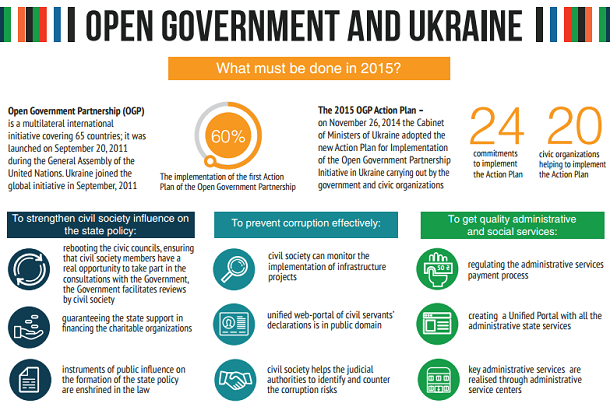


 Open Government Partnership published December Newsletter in which Ukraine's commitment on Regulating Access to Communist-era Archives became the Featured OGP Commitment. The above-mentioned commitment aims at regulating access to the files of the Soviet period secret services and law enforcement agencies. General Law of Ukraine does not provide effective mechanisms for accessing these files and many of the archives remain closed for researchers or the documents are difficult to access. The archives are spread out among different institutions and are not well-administered.
Open Government Partnership published December Newsletter in which Ukraine's commitment on Regulating Access to Communist-era Archives became the Featured OGP Commitment. The above-mentioned commitment aims at regulating access to the files of the Soviet period secret services and law enforcement agencies. General Law of Ukraine does not provide effective mechanisms for accessing these files and many of the archives remain closed for researchers or the documents are difficult to access. The archives are spread out among different institutions and are not well-administered.
New management of the relevant state agencies appointed in 2014 has promoted open access policy, but there were legal obstacles that hindered effective access and management of these documents. Prior to adoption of the OGP action plan several NGOs started working on the relevant draft law, but the OGP action plan became the first official commitment to proceed in this direction.
The Government exceeded the planned implementation of the commitment. The Government submitted the draft law, developed by NGOs and the Ukrainian Institute of National Remembrance, to the Parliament in April, 2015 which was adopted at the first and final hearing. The law on Access to Archives of Repressive Bodies of the Communist Totalitarian Regime of 1917-1991 determines special procedure for accessing relevant archives and lists grounds for restricting such access. The Law mandates the law enforcement, security and other agencies to transfer relevant archives that they possess to a special state archive to be set up and managed by the Ukrainian Institute of National Remembrance.
Ukraine joined the Open Government Partnership in 2011 and it is working on the implementation of the second OGP action plan 2014-2015.
It should be noted that the civil society has become more active in regards to the implementation of the Open Government Partnership commitments after the change of the government in Ukraine. Enhanced activism was provoked by the increased expectations for eradication of corruption and establishment of an open and transparent governance. Thus, CSOs have been actively advocating for political changes in order to implement profound administrative and structural reforms and increase transparency and accountability of the government.
In March, 2015, Transparency International - Ukraine conducted a research which demonstrated that 68.4% of the Open Government principles are regulated by the law, however only 51.7% of them are being implemented. In addition to this, Transparency International - Ukraine along with 100 SCOs sent a public letter to the Prime Minister of Ukraine - Arseniy Yatesenyuk. The letter urged the Prime Minister to review and support the implementation process of the Open Government principles. Moreover, NGOs were asking the Prime Minister to renew the Open Government Council that is responsible institution on implementing the OGP Action Plan commitments.
It should be noted that access on communist-era archives is provided in Georgia. Academy of the Ministry of Internal Affairs of Georgia took a responsibility laid out in the Open Government Partnership Georgia Action Plan 2014-2015 on classifying and publishing relevant documents. In the action plan, "commitment 24: Classifying the documents protected at the Ministry of Internal Affairs Archive and publishing" - initiated by the Institute for Development of Freedom of Information (IDFI), it is noted that MIA Academy which houses the archives of three Soviet bodies: the Committee for State Security, the Ministry of Internal Affairs and the Central Committee of the Communist Party of SSR Georgia, used to be one of the most closed and hardly accessible institute in the Soviet Times, as well as after Georgia gained independence. Due to high public and scientific-research interest towards the archives the MIA took the above-mentioned responsibility on classifying the documents according to a modern catalog system.
MIA Archive has already carried out various initiatives in this regard, for instance, special publication "Secret History of Soviet Georgia" was issued, which consists of the articles covering 1921-1989 years. In addition, "Histories of Repressed", "Find your ancestor", etc. projects were launched.
Documents protected at the MIA Archive are open to every individual and accessing part of them via internet is possible, while the process of digitalization of other documents is ongoing.
Moreover, Institute for Development of Freedom of Information (IDFI) implemented the project "Stalin's Lists on Georgia" in 2011-2012. The project was financed by the Heinrich Böll Foundation South Caucasus Regional Office and the Embassy of Switzerland in Georgia and implemented with cooperation of the MIA Archive. Within the framework of the project photos and documentaries were found on 3,616 people. It is planned to publish a book which will reflect history of victims, during "Great Terror" of 1937-1938 years, who were convicted directly by the order of Stalin and other members of PolitBureau.
IDFI has organized exhibitions of the pictures mentioned above in Tbilisi and Rustavi for couple times which the Institute found in the MIA Archive, MIA Analytical Department and in archives of the Society "Memorial" of Georgia.